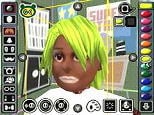Mario Artist: Talent Studio: Difference between revisions
Reddragon19k (talk | contribs) m (→Trivia) |
No edit summary |
||
| Line 12: | Line 12: | ||
|media= | |media= | ||
|requirements= | |requirements= | ||
|input= | |input={{input|n64=1}} | ||
}} | }} | ||
'''''Mario Artist: Talent Studio''''' is a Japan-only game released on February 24, 2000 for the [[Nintendo 64DD]], as part of the ''[[Mario Artist]]'' series. It was one of few games released for the system, because the system was a failure. | '''''Mario Artist: Talent Studio''''' is a Japan-only game released on February 24, 2000 for the [[Nintendo 64DD]], as part of the ''[[Mario Artist]]'' series. It was one of few games released for the system, because the system was a failure. | ||
[[Image:IMAGE3.JPG|left|frame|''Mario Artist: Talent Studio''; creating a character.]] The main feature is the creation of characters, whom the player could put into different movies and animations, such as the character walking down a catwalk. There are many customizable features for the characters, such as body style, size, face, hair, clothes, bio, voice and more. The character creation may be a prototype for [[Miis]], even though it has many more features. The player can also import these people into the other Mario Artist games. The game can also insert pictures from cameras and videos onto 3-dimensional models, and then animate the models. Using the bundled Capture Cartridge, the player could create movies by running a video camera through it. | [[Image:IMAGE3.JPG|left|frame|''Mario Artist: Talent Studio''; creating a character.]] The main feature is the creation of characters, whom the player could put into different movies and animations, such as the character walking down a catwalk. There are many customizable features for the characters, such as body style, size, face, hair, clothes, bio, voice and more. The character creation may be a prototype for [[Miis]], even though it has many more features. The player can also import these people into the other Mario Artist games. The game can also insert pictures from cameras and videos onto 3-dimensional models, and then animate the models. Using the bundled Capture Cartridge, the player could create movies by running a video camera through it. | ||
==Trivia== | ==Trivia== | ||
*[[wikipedia:Kazumi Totaka|Kazumi Totaka]]'s secret song is said to be hidden in this game. | *[[wikipedia:Kazumi Totaka|Kazumi Totaka]]'s secret song is said to be hidden in this game. | ||
Revision as of 06:50, February 27, 2011
Template:Infobox Mario Artist: Talent Studio is a Japan-only game released on February 24, 2000 for the Nintendo 64DD, as part of the Mario Artist series. It was one of few games released for the system, because the system was a failure.
The main feature is the creation of characters, whom the player could put into different movies and animations, such as the character walking down a catwalk. There are many customizable features for the characters, such as body style, size, face, hair, clothes, bio, voice and more. The character creation may be a prototype for Miis, even though it has many more features. The player can also import these people into the other Mario Artist games. The game can also insert pictures from cameras and videos onto 3-dimensional models, and then animate the models. Using the bundled Capture Cartridge, the player could create movies by running a video camera through it.
Trivia
- Kazumi Totaka's secret song is said to be hidden in this game.
| Nintendo 64 games | ||
|---|---|---|
| Super Mario franchise | Super Mario 64 (1996) • Mario Kart 64 (1996) • Mario no Photopi (1998) • Mario Party (1998) • Mario Golf (1999) • Mario Artist: Paint Studio* (1999) • Mario Party 2 (1999) • Mario Artist: Talent Studio* (2000) • Mario Artist: Communication Kit* (2000) • Mario Tennis (2000) • Paper Mario (2000) • Mario Artist: Polygon Studio* (2000) • Mario Party 3 (2000) • Dr. Mario 64 (2001) | |
| Donkey Kong franchise | Diddy Kong Racing (1997) • Donkey Kong 64 (1999) | |
| Yoshi franchise | Yoshi's Story (1997) | |
| Crossovers | Super Smash Bros. (1999) | |
